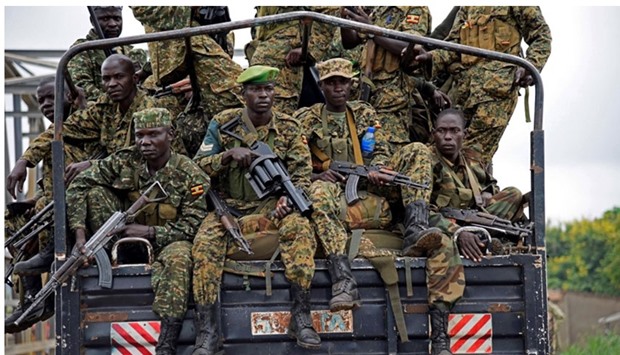The United Nations has warned of tension and the possibility of fresh fighting in Juba, where a ceasefire has held since late Monday.
President Salva Kiir on Thursday called on arch-rival Riek Machar to meet for talks to salvage peace. "I don't want any more bloodshed in South Sudan," Kiir said.
Kiir spoke in public for the first time at the bullet-scarred presidential palace where four days of fighting erupted on Friday, standing alongside ceasefire monitoring chief Festus Mogae, a former Botswanan president, and African Union special envoy Alpha Oumar Konare, a former president of Mali.
Earlier Thursday a convoy of around 50 Ugandan trucks escorted by machine gun-mounted armoured vehicles crossed the border at Nimule to open up a secure corridor for fleeing civilians on the 200 kilometre (120 mile) Juba-Nimule road.
Uganda's army chief Brigadier Leopold Kyanda said the mission involving 2,000 soldiers would likely last "two to three days" but an intelligence officer said some Ugandan troops may remain in Juba.
"Why not? We have the capacity to support the government of South Sudan and we were there before," said the plain-clothed officer accompanying the convoy.
One city, two armies
The Ugandan army joined the conflict in South Sudan soon after it began in December 2013, fighting on Kiir's side against a rebel force led by Machar, now the country's vice president. The troops only pulled-out late last year.
While the situation remained calm in Juba on Thursday concerns remain that fighting might flare once again.
"The current situation in the country remains fluid and uncertain," UN peacekeeping chief Herve Ladsous told the Security Council late Wednesday.
Four days of intense battles in the capital left hundreds dead and forced around 40,000 to flee their homes. Aid agencies are warning of a worsening humanitarian crisis with a lack of both water and food.
The recent violence in the capital echoed the fighting that triggered the civil war and marks a fresh blow to last year's deal to end the bitter conflict that began when Kiir accused Machar of plotting a coup.
Kiir is a member of the Dinka tribe, while Machar is a Nuer, and the dispute has split the country along ethnic lines and caused tens of thousands of deaths.
The August 2015 agreement paved the way for Machar's return to the capital in late April to take up the deputy post in a so-called unity government.
Machar's return with a 1,400-strong bodyguard meant there were two hostile armies in the city. A shoot-out between Kiir's and Machar's guard units triggered the fighting that began on Friday afternoon.
It appears that Kiir's forces -- which outnumbered Machar's in both troops and heavy weaponry in the city -- dominated the battles, with Ladsous stating they were in "full control" of the capital while Machar's former rebels were "scattered" nearby along the city's western outskirts.
'Further clashes'
"Further clashes, therefore, cannot be ruled out," he said.
One of Machar's spokesmen said the former rebels' base was "destroyed" and Machar is "a vice-president in hiding" not far from Juba.
"He's trying to survive. His life is in danger," claimed Goi Jooyul Yol in Addis Ababa, Ethiopia.
However, Kiir insisted that neither Machar nor his allies were in danger. "If there was anyone hunting for them, they could find them," Kiir said. "I am ready to protect Machar if he comes."
Outside Juba there were reports of fighting in the towns of Leer in Unity State and Wau in Western Bahr el Ghazal and of army and rebel forces mobilising around Malakal in Upper Nile.
"We remain very worried about the potential for the resumption of violence and spill-over into other parts of the country," said Ladsous.
Commercial flights resumed to Juba on Thursday morning, with planes arriving almost empty and leaving full of people desperate to get out of the city.
Specially chartered evacuation flights have been taking foreign nationals out of the country since Wednesday.

